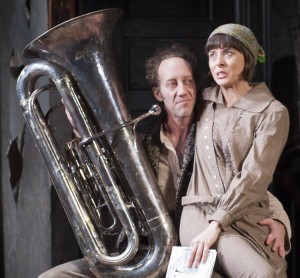It's probably safe to say that George Gershwin’s notion of Russian drama as he described it in his classic “But Not for Me” is probably what most people think of it: “I’ve found more clouds of gray/Than any Russian play could guarantee.” It's to Moira Buffini’s credit that her 2007 adaptation of Nikolai Erdman’s play The Suicide will come as a surprise to anyone who thinks Russians don’t write comedies.
Buffini, herself a playwright (Loveplay, Dinner), has dug out the laughs in Erdman’s 1928 satire, renamed Dying for It, while keeping the pointed social commentary on the desperation of ordinary Russians a decade after the Bolsheviks took power. Although the play is rarely revived, it is not completely obscure: it was seen on Broadway briefly in 1980, with Derek Jacobi starring.
As the play begins, life for the hero, Semyon Semyonovich Podeskalnikov (Joey Slotnick), and his wife, Masha (Jeanine Serralles), is anything but peachy. They’re poor, he’s hungry, and they sleep on a bed in the hallway of a tenement house, with blackened stairs, acutely peeling wallpaper, and no privacy. The Communist revolution hasn’t brought the prosperity hoped for by the poor. Moreover, Semyon’s mother-in-law, the opportunistic Serafima, inhabits the room off the landing.
The despairing Semyon complains of a lack of food, much like the tramps in Beckett's Waiting for Godot. When he finds an advertisement for playing the tuba under some floorboards, he thinks he has the ticket to wealth: he’ll learn it and be paid for playing. But just from looking at Slotnick, who brings a Sad Sack quality to the character, it's evident that things aren’t going to pan out. His struggle with the tuba comes to an amusing but bitter end. Semyon decides to commit suicide, and runs off to buy a gun, leading to a comic chase to rescue him that involves his upstairs neighbor, the bearish Kalabushkin (CJ Wilson); Kalabushkin's lover, Margarita, who owns a popular bar; and Yegor, a postman and devout Communist who lives upstairs.
Semyon returns with the gun, but before he can use it, Erdman introduces a variety of colorful characters eager to delay his promised death until they can further their own ends through influencing his suicide note. They include Aristarkh Grand-Skubik, a dispossessed landowner who wants Semyon's note to blame the government; Kleopatra “Kiki” Maximovna, a romantic who wants him to dispatch himself for her in the name of love; and Father Yelpidy, a dour Orthodox priest who wants Semyon’s death to stand for the godlessness of the current society, in hopes it will bring people back to the church. Civil servant Yegor steps in to urge Semyon to “do it for the Party…you owe them everything.” Last to put his two rubles in is Patch Darragh as Viktor Viktorovich, a poet (“I am the voice of the Russian man,” he declares); he wants Semyon to declare in his note that Russia needs art.
This string of visitors to Semyon might have become repetitive, but director Neil Pepe has cast some splendid comic actors in the roles, and they’re varied enough not to wear out their welcomes. The ever-reliable Robert Stanton is a dapper and high-minded Aristarkh; Clea Lewis is a squeaky-voiced, beckoning Kiki; Peter Maloney is a delightfully high-kicking, hard-drinking cleric; and Ben Beckley as the straight-arrow Yegor reveals some creepy sexual inclinations.
As Semyon, Slotnick uses his nebbishy looks and deadpan delivery to create a character floundering with neurotic bewilderment. But he is also an Everyman for these tough economic times of chronic unemployment: “I have no dignity, no labor, no value at all,” he says. Slotnick manages to keep a balance between hope and despair, so that one is always guessing whether he will or won’t shoot himself. Seralles has some comically explosive moments as Masha, and Mary Beth Peil as her manipulative mother has one of the slyest comic lines in the play, as she offers a bite to the priest: “Father, I poked around and found a little bit of meat. I know you’d rather have a biscuit, but it’s chicken-style stew.”
Erdman’s play was banned in the Stalinist era, and it’s easy to see why. But apart from its politics, it still has a lot to say about the importance of work and the effects of unemployment and poverty on people’s lives. With Buffini's refurbishment, Dying for It proves astonishingly apt for the times.
Dying for It plays at the Atlantic Theater Company, 336 W. 20th St., through Jan. 18, with evening performances at 8 p.m. Wednesday through Saturday, and at 7 p.m. on Tuesday. Matinees are at 2 p.m. on Saturday and Sunday. For tickets, which are $20 and $65, call OvationTix at (866) 811-4111.








